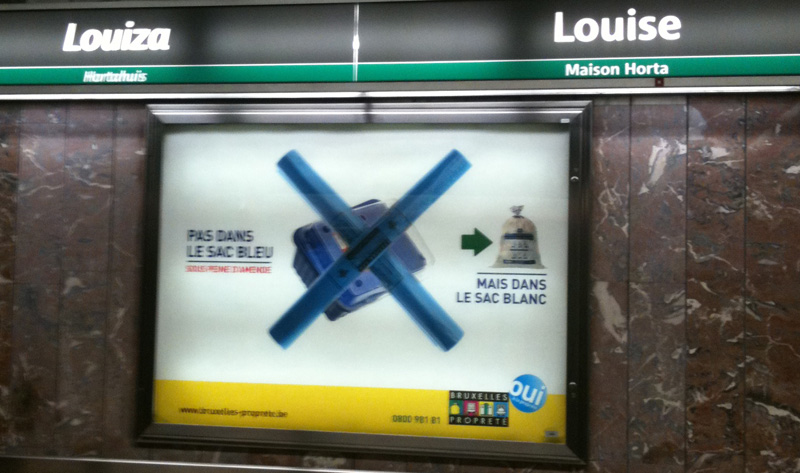
Exactly what waste can be easily recycled in municipal recycling schemes? It’s a question that perplexes even the most committed recyclers.
Plastics are usually the most complicated, as only certain types of plastic (normally plastic drinks bottles) can be recycled, and other types of plastic cannot be put in the recycling bags.
But at the margin, how should the local council responsible for recycling react?
Not, I would argue, in the way Brussels is currently behaving. Billboards like the one above fill the Brussels Metro, warning that putting yogurt pots or plastic mushroom boxes in the blue bag recycling scheme is not only incorrect, but can incur a fine if these objects are placed in the wrong bag. The clear message: if in doubt, don’t recycle. Plastic drinks cups or tomato boxes – are they acceptable? Probably not (according to the Bruxelles Propreté site) but better not even try it as a fine might be levied.
Further, if I do want to make the effort to recycle such things (and might even go to a local recycling centre), how can I do that? No information whatsoever is provided.
In short, this is one of the oddest and most counterproductive bits of government PR I’ve seen in recent times. The idea of the Brussels blue bag scheme, and other similar systems in other European cities is to make recycling as easy as possible – put the waste in the bag and the recycling centre sorts it out. As simple as possible for the citizen. The Brussels ads seem to have precisely the opposite effect, making citizens nervous and less inclined to recycle.








One more good idea would be to put info on how to recycle in Brussels in ENGLISH somewhere on the web… and maybe add an English language sentence to such street ads, I can see there was space left in the bottom of the poster. Maybe I’m not the only foreigner in this city who doesn’t speak French fluently yet…
Because of this, your post was especially useful for me this time 🙂
Greetings,
Sarolta (ex CEEweb now EEB)
Jon, you really hit the nail with this – highlighting the psychological aspect of this campaign. And more, I even can’t recognise some of the “forbidden” things that should not go into the blue bag.
Here is at least some kind of overview what should and what should not go into the bags: http://www.bruxelles-proprete.be/Content/html/dechets/index.asp
But the presentation of the website is – to put it lightly – outdated. Why don’t you propose them an online game where one can exercise the sorting game with *real* items, instead of general descriptions.
JM, do you have some background info on the incinerator deal?
I read that there are three R’s in the waste management debate.
First, REFUSE, ie refuse to buy something that is twice or even triple wrapped in un-recyclable plastic; or strip off the wrapping at the till and leave it in the supermarket’s bin; or put it into a plastic bag and hand it to a member of the super’s staff – telling them, politely of course, what the problem is.
Second, RE_USE, ie find something useful to do with the stuff, if you can (I haven’t found anything that one can usefully do with plastic wrapping).
Third, RECYCLE – except that, with this stuff we can’t.
So, we’re left with option REFUSE: we need a consumer revolt!
It seems that all rests on what contracts your own waste collection company can find (that make it worth their while to collect and sort the stuff, of course).
Here, in our corner of France, we have just learned that “glass” for re-cycling does not include kitchen-ware, broken window glass or drinking glasses, because they are of a different chemical composition from bottles and jars. Since we are barred from putting such items in our normal waste bags too – we are left wondering just what we CAN do with the stuff.
Like you, Jon, we have to be careful to sort our plastics. But if re-cycling and being environmentally more “friendly” were easy, we shouldn’t need to be forced into doing these things.
NB I caught a documentary on Mumbai and their fantastic “re-cycle everything” approach when I was in the UK earlier this year. Why don’t some of our “experts” go there and ask to be taught a few lessons?
If local authorities would really want to minimise costs and toxics and maximise recycling in case like this they should work upstream and ban those plastics that can’t be recycled -giving some time to producers to replace them with recyclable plastics-.
This is just one more example of how the citizens have to pay a cost that should be shouldered by the company. If a company sells non-recyclable plastics and is not liable for the disposal costs what is happening is that those costs have to be paid by the citizens.
But anyway, as far as Brussels is concerned the issue is a lot simpler: the city has a contract with an incinerator that needs to be fed for the next decades so “the worst thing” it could happen to the city is that all plastics would be recycled: they would starve the incinerator!. They want them in the white bag because of their calorific value and have no incentive to reduce waste. So far for the environmental record of the capital of Europe. Yet another example of bad waste management.
Wandsworth’s all-in-one-bag, combined with good procurement contracts, makes it’s recycling scheme really easy to use.
My home town has the worst recycling record in the UK, and a fortnightly blue box recycling scheme – only takes cans, newspaper (not card or envelopes), glass – town centre only.
No plastics recycling at all – that needs to go to neighbouring council areas where that can be recycled as it is apparently uneconomic and not terribly good for the environment to recycle it according to my locality…